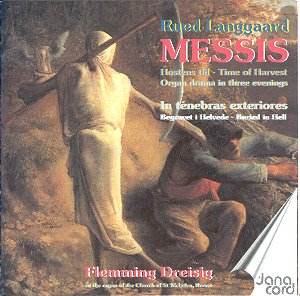Rued LANGGAARD (1893-1952)
Messis - Organ drama in three evenings (1932-37)
[37.43+42.17+20.46]
In Tenebras Exteriores (1947) [18.09]
 Flemming Dreisig (organ)
Flemming Dreisig (organ)
Organ of The Church of St Nicholas, Ronne, Denmark, Nov 1997, May 1998
 DANACORD DACOCD
485-486 [CD1 55.54; CD2
68.34]
DANACORD DACOCD
485-486 [CD1 55.54; CD2
68.34]
Crotchet
£25.99
AmazonUK
£21.99 AmazonUS

Langgaard's family background was saturated in music. Not for this composer
a battle against parental apathy or outright hostility. His struggle was
that of an out-of-time late-romanticist against the forces of modernism.
That opposition and the resulting conflict were as vehement and dismissive
as the forces flooding the battle plain between the partisans of Brahms and
Wagner. The buffets Langgaard took were all the more shocking to him because
of his supportive, not to say cocooned, family background. This ill-prepared
him for the thrust and cut of artistic journalism and institutional judgements.
Triumphs came with his orchestral works Sfinx and Symphony No 1
Klippepastoraler the latter under Max Fiedler's baton in Berlin in
1913. Grants and scholarships were his in plenty in the first half of the
1920s. He heard his Symphony No 2 Vaarbrud performed in Essen in 1921
and in Vienna in 1922. He conducted his Fourth Symphony Løvfald
(Leaf-fall) in Heidelburg in 1921. However, from circa 1926 onwards, life
became increasingly arduous. This coincided with the growing prominence of
Nielsen in Danish musical life. During the 1930s Langgaard proselytised for
romantic music with Niels Gade his high priest; indeed the notes G A D E
are deployed in the Postludium to Messis. Swimming against
the undertow, Langgaard suffered as did many romanticists. In 1940 he, at
long last, landed the office of organist at Ribe Cathedral - Ribe being a
small city in West Jutland. The congregation were not at ease with this man
who they viewed as a crazed eccentric. Nevertheless the composer presented
the first evening of Messis in the Cathedral in 1950, 1951 and 1952.
How to describe the music on this disc? Its forebears are Liszt and Schumann.
Langgaard links sequences of short musical sentences with much longer paragraphs.
Sincerity is never in doubt. He is not one to hide his ideas under drifts
of complexity.
In tenebras is in four sections. Was buried has a Scottish
snap and a sense of defiant rearing up. In the kingdom of death uses
a long lyrical theme with a touch of what English listeners might hear as
Walford Davies offset with a pert colt-like little figure. The grand harmonic
crunch is reserved for the concluding Remember.
Messis is in three 'Evenings' and a Postludium. It was never
performed complete in public during the composer's lifetime. In it Langgaard
intended to convey harvest-time as an analogue of the end of the world and
the Second Coming. The four movements take in a broad vista: walking tunes,
a sense of smoothly Delian moonlit contemplation, in Harvest Time a
headlong virtuoso dive into dissonance, the stern calls of Reubke, lovely
reveries (track 7 4.30) and a cleanly structured sense of drama. One gets
the impression that this music can be awkward or laborious to play but Dreisig
triumphs over adversity. In a work where strange coups of the imagination
are not unusual the sotto voce Tapiola-like whirlpool figures
at 7.10 (Track 7) stand out. While the final movement (Crucifixion)
has some passages of volcanic fury it is difficult to recognise the work
described in one example of contemporary press reaction: "this most peculiar
berserk fury of a work." This section was first played at the Vor Frue Kirke
in Copenhagen on 22 April 1936.
The second disc 'houses' the other two evenings and the
Postludium. The Second Evening (Juan) takes us back into Delius
territory. You should note in track 2, at 8.58, a hunted rippling tune.
Rondo (3) makes use of a simple repeated cell. The spirit of this
music links with the Liszt tone poems. It has moments of great majesty as
in the shattering declamation at 2.58 (3). In Nocturne and Fugue a
darting Bachian piping (1.20) is eerily ghoulish. The Postludium
sets a high reed theme against deep music in an atmosphere of disturbing
romance.
The Third Evening combines whispered solace (track 6 I was
buried), tramping remorselessness, effortless Tchaikovskian themes (track
7 In the kingdom of death) and angular assaults. There are also
prayer-like shards, splenetic explosions (8 Have mercy) and a slowly
bubbling restful solace (9 Remember that thou receivedst thy good
things). The Postludium (10) is at once cheery and somehow less
weighty than it should be. The language is one of slightly refracted tonality.
These works are a rich seam for organists prepared to think outside the Bach,
Buxtehude, Howells, Vierne, Widor 'box'. Across the eighteen tracks in this
set there is not one that would not illuminate, challenge and elevate worship
or reflection.
Langgaard is a most fascinating composer. His ideas, while familiarly echoed
across his massive output in much the same way as Martinu, Pettersson and
Bax, are never less than sincere. He is a composer who, once he grips your
mind, will not easily be shaken free.
Unless you are an organist or have a special interest in organ music I would
not necessarily start here in exploring Langgaard - rather experiment with
any of the sixteen symphonies or Sfærernes Musik.
No company has matched Danacord's costly dedication to Langgaard. All the
symphonies, the opera-oratorio Anti-Christ, two collections of piano
music and much else are available in their catalogue. Da Capo, Chandos and
ClassicO have each done their bit but it is Jesper Buhl's Danacord which
has provided the backdrop and most of the core territory.
Rob Barnett
If in difficulty by all means contact the UK distributors:
Discovery Records Ltd
discovery.records@virgin.net
phone +44 (0)1672 563931
fax +44 (0) 1672 563934
or Danacord via their website at
www.danacord.dk

